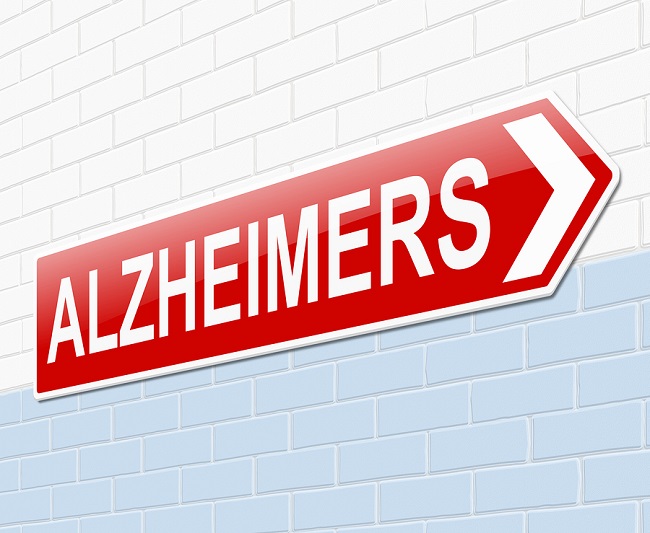- Make It Yourself Lavender Heart-Shaped Bath Bombs!
- 20 Things You Never Knew About “Down There”
- 12 Best Foods For Those Suffering From Arthritis Pain
- 12 Personal Hygiene Mistakes Almost Everyone Makes (Mom Never Told You About #4!)
- 15 Medicinal Plants And Herbs From The Cherokee People
- 12 Mind-Blowing Benefits Of Drinking Coconut Water During Pregnancy
- 12 Outstanding Winter Foods That Won’t Fatten You Up Like A Christmas Turkey
Top 10 Lies Everyone Believes about Alzheimer’s Disease

Photo credit: bigstock
September is World Alzheimer’s Awareness month. In honor of that, let’s take a look at the top 10 lies and misconceptions people have about this terrible disease of the brain.
1. If you are losing your memory, you must have Alzheimer’s disease
Not true. Forgetting things every now and then is completely normal, no matter what your age. How can you tell the difference? Normal forgetfulness is forgetting where you left your car keys. Alzheimer’s is not knowing what your car keys are for. Many people with Alzheimer’s forget how to do formerly familiar tasks such as dressing themselves, or getting a glass of milk from the refrigerator. They also have communication problems such as not understanding phone calls or not understanding things that are said to them. For example, they might hear “Let’s go to the store” as “Let’s go to the doctor.” Some of these symptoms come from treatable causes such as drug interactions, infections, or brain tumors, so you should always consult a doctor for a diagnosis.
2. Alzheimer’s only affects the elderly
It is true that our risk of developing Alzheimer’s disease increases as we age, the vast majority of cases show up after 60 years of age. Your risk of developing Alzheimer’s doubles every 5 years after the age of 65. Some estimates say that 50 percent of those over 85 have some form of dementia.
This being said, Alzheimer’s disease appears in people who are only 40 or 50 years old. There have even been a few rare cases of patients in their 20’s developing Alzheimer’s. Unfortunately, Alzheimer’s disease is already in advanced stages by the time most symptoms become obvious.
3. Aluminum causes Alzheimer’s
Although there has been a great deal of research into the link between Alzheimer’s and aluminum, the only thing that researchers seems to agree upon is that there still is insufficient evidence to prove that aluminum causes Alzheimer’s. Unfortunately, there doesn’t seem to be a great deal of consensus about what the root cause of Alzheimer’s actually is. There are many theories, but no hard evidence. Read also about dangerous lin between aspartame and Alzheimer’s.
4. Those with Alzheimer’s are aggressive and violent
Although Alzheimer’s does tend to cause personality changes, not everyone becomes violent or very aggressive. Some victims of Alzheimer’s become as innocent and docile as small child. Many of the common behaviors are wandering, trying to go “home”, suspicion, hiding objects, restlessness, and repeating actions or questions.
Trying to deal with the confusion and memory loss that goes with Alzheimer’s is both frustrating and frightening for victims of this terrible disease. Family members and caretakers should learn how to communicate effectively in order to avoid overly emotional responses.
SEE ALSO: 10 Early Warning Signs of Alzheimer’s
5. People with Alzheimer’s don’t know what’s going on around them
This is absolutely not true. Symptoms are deceiving. Persons with Alzheimer’s may not be able to communicate well and become easily confused, but that does not mean they are not aware of what is going on around them. They still have emotions and feelings, even though their memories and abilities to express themselves have changed. For example, a patient might not remember that his parents have passed away, but if you tell them, they will cry as if they just heard the news for the first time. Every person on earth needs social connections and interactions, a sense of belonging and feelings of happiness. Even persons in the late stages of this disease respond to touch, and find comfort in soothing music and kind voices.
Continue to Page 2

Photo credit: bigstock
6. Alzheimer’s mainly affects men
This is an absolute myth. This disease affects both men and women. In fact, women make up a full two-thirds of all Alzheimer’s cases. Although there is no cure for this disease, you can help prevent Alzheimer’s by eating an all-natural diet as much as possible and keep your brain active by learning new things and by being socially active.
7. Alzheimer’s is simply a normal part of aging
We used to call Alzheimer’s disease “going senile.” We also used to believe that this was a normal part of growing old, but with new technology, we now know that Alzheimer’s is a degenerative disease of the brain that actually causes physical changes to the brain. Alzheimer’s involves neurofibrillary tangles, the development of amyloid plaque, and nerve cells in the brain losing contact with each other or dying off completely. None of these things are normal.
This disease is irreversible and it is progressive, but not an unavoidable part of the aging process.
8. If your family members get it, you will too
Although genes do play some type of role in our chances of developing this disease, they actually represent only a very small number of cases. Five to seven percent of all Alzheimer’s cases are something called Familial Alzheimer’s disease, an inherited form of this disease. (Sometimes it’s called “early onset”) Although the disease itself is the same as the more common Sporadic Alzheimer’s disease (referred to as “late onset”), the difference is in a set of mutated genes that are passed from one generation to the next one. If one of your parents carries this mutated gene, you have a 50 percent chance of inheriting this gene and the disease. If you do have this mutated gene, chances are you will develop Alzheimer’s.
However, with the sporadic form, if you have a sibling or parent with Alzheimer’s, you have a three times greater risk than someone with no family history of this disease. Experts say that it’s not the genes that cause Alzheimer’s however. Some people with this gene do not develop Alzheimer’s while others without the gene do. We still don’t know enough about what causes this terrible brain disease.
9. Alzheimer’s doesn’t kill
Yes, unfortunately, it does. What happens in our brains affects the rest of the body. In later stages, the body begins to shut down systems that affect the skin, senses, blood pressure, and breathing. Victims experience longer episodes of sleep, pain, infection, discomfort, and pneumonia often sets in.
Alzheimer’s is one of the top 10 causes of death throughout the world in 2007. (The latest data available) It’s the 7th leading cause in Canada and 6th in the United States. Alzheimer’s kills more people every year than kidney disease or infections such as influenza.
10. Once you have Alzheimer’s, there is no hope
Researchers are constantly finding better ways to detect the disease, test new treatments, and possibly even develop a vaccine. Scientists are constantly learning more about Alzheimer’s disease, and there are new treatments constantly coming out to help manage symptoms and improve the quality of life for those afflicted with this disease. Being diagnosed with Alzheimer’s does not mean you suddenly will have a loss of independence. Health experts will tell you that it’s important to focus on what you can do, not on what you can no longer do. If you think that someone you love, or even yourself, might have Alzheimer’s, see your doctor. Many treatments work best with early diagnosis.
Sources:
Alzheimer Society of Canada
Alzheimer’s Association
Alzheimer’s Society
(By the way, if you’re enjoying this article, you may want to subscribe to the Naturalon’s free newsletter; get breaking news alerts on GMO’s, fluoride, superfoods, natural cures and more… You privacy is protected. Unsubscribe at any time.)





























